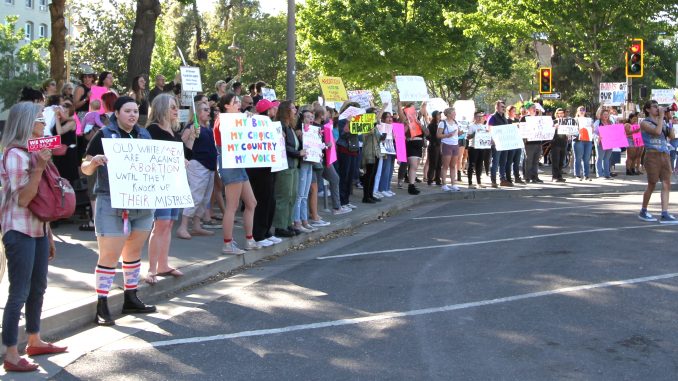
When Mayor Andrew Coolidge gaveled open the Chico City Council meeting at 6 p.m. Tuesday (May 3), an unusual atmosphere permeated the chambers. He conducted business as usual, but with roars from outside piercing the bubble, this was no normal evening.
An hour before, hundreds started rallying at City Plaza, facing council chambers, following news that the Supreme Court would be overturning Roe v. Wade. County Supervisor Debra Lucero, Councilwoman Alex Brown, congressional candidate Max Steiner and former congressional candidate Audrey Denney were among the masses—spanning age groups and genders—who chanted and waved signs for women’s reproductive rights.
Passersby—everyone from students and business people to postal-truck drivers and firefighters—honked horns, pumped fists and shouted support.
The rally’s echoes waned around a half-hour into the meeting.
“The City Plaza demonstration makes me feel, as usual, proud to be a Chicoan, makes me feel hopeful that the citizens of our community are fighting for what’s right, and I would say that was a clear demonstration of the will of the people,” Brown told the CN&R by phone Wednesday morning (May 4). “That has been the case repeatedly in the City Council chambers, [where] that’s the will of a majority of six speaking, not the will of the people.
“When I was in chambers hearing the will of the people outside, it was a stark reminder that we’ve got a lot of work to do that we’ve got to have a local community and a country that’s equitable and fair and just.”
Apart from ambient sound, the rally did not spill over to the meeting, which drew sparse attendance (a dozen) and public comment (a half-dozen speakers plus one online submission). No one addressed or acknowledged it. Vice Mayor Kasey Reynolds told the CN&R afterward, “What they were talking about out there, city government has no control over, so I wasn’t really worried about that; that had nothing to do with us—and everything we had on the agenda was pretty straightforward, easy stuff.”
Coolidge agreed, telling the CN&R by phone, “I don’t think it was a protest against council, I think it’s just on the national issue; I think everybody realizes we’re not involved in that, obviously. But I think that will be a contentious issue moving forward. Abortion has always been one of the most heated topics in the U.S., historically at least.”
Brown feels the city and council should be involved. The lone progressive among conservatives, she said her colleagues have “made it clear that they’re taking a small-town view of what the responsibility of city government is. They have repeatedly denigrated the idea that issues that affect the country also affect local communities and have stated that local government has no place in broad issues like the right to choose, like LGBTQ rights and far beyond that.
“The reality is these issues that people are speaking up about are incredibly consequential to our entire national landscape, which affects our local landscape.”
Patrick Newman, founder of the advocacy and service group Chico Friends on the Street, also noted the silence in chambers versus the outrage outside—the former all too common, from his vantage.
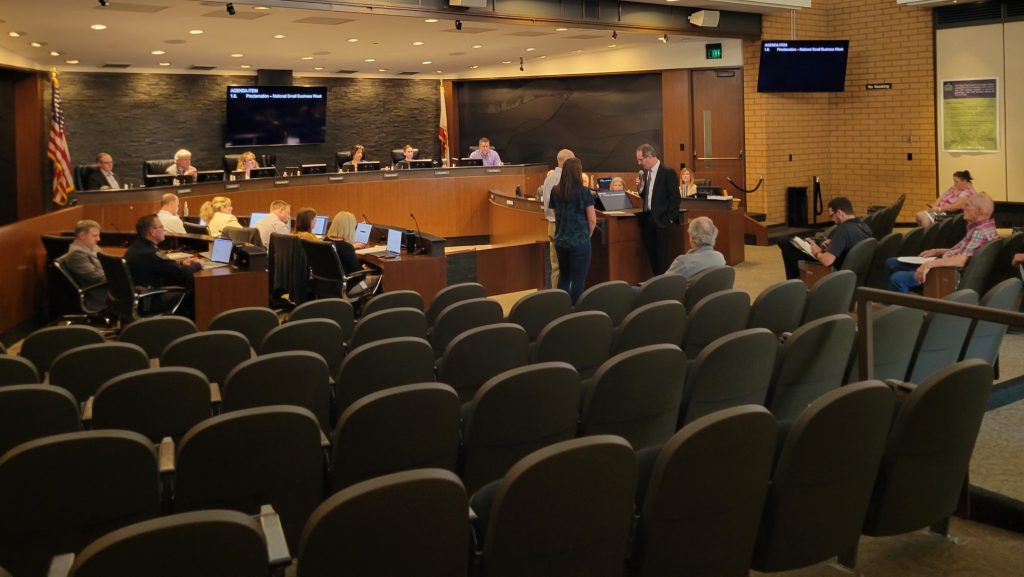
“I’m 100 percent in favor of reproductive freedom and 100 percent supportive of government-funded medical services for both women and men,” Newman told the CN&R by email. “But I find it interesting that 500 highly energized people will show up to defend their own rights, but it’s generally impossible to find two or three people who will show up when the rights of the homeless are violated—a daily occurrence.”
Shelter, sewer, sales tax
Several citizens did speak on the Pallet shelter, whose opening (on April 25) Interim City Manager Paul Hahn detailed in a report early in the 90-minute meeting. Their main concern was the facility’s requirement that guests muzzle their dogs; both Robin Tripp of Chico Homeless Animal Outreach and veterinarian Jim Esh raised issues of animal safety. Jesica Giannola and Newman broached intake.
Hahn reported the 177-unit shelter had 45 steady residents and more will come as the city moves “methodically” through areas totaling 50 campers, in three-week cycles. (First up is downtown—City Hall, City Plaza, Lost Park, Annie’s Glen—due to the proximity of downtown events like Thursday Night Market and Friday Night Concerts.) He said the city was being “creative, humane, trying to balance needs of the homeless and the community.”
Coolidge told the CN&R he’s “very happy with the progress that we’re making now. It’s just the beginning of May; you look at this since just January, it’s been lightning-pace speed for a city to move this quickly and get a Pallet shelter up and running…. It’s pretty miraculous, I think, in terms of the timing of it, and of course I’m very pleased to be getting back to enforcement [of anti-camping ordinances] in our parks and waterways.
“Paul [Hahn] stressed patience,” he added, “and I think we still need to stress patience in our community.”
To Brown, though, the report was more status quo: “Head in the sand, as usual. Willful ignorance of the bigger picture of how our community is feeling and what they’re experiencing—and painting a pretty rosy picture of what’s taking place as it relates to the homelessness issue, which has affected so many.”
Newman extended his criticism to another matter, city funding. He continued a theme from previous meetings about decaying infrastructure—notably roads, as presented April 19, and sewer, on Tuesday’s agenda—as a consequence of underinvestment.
As the council considered a draft agreement to connect Paradise to Chico’s wastewater treatment plant, Newman posed whether the facility could handle the load, given years of deferred maintenance, even after the city collects a $14.9 million connection fee from the town. He pointed to infrastructure again on an item involving staff pay. Newman voiced support for a sales-tax increase, which the council voted last fall to put on the November ballot. (Another speaker, real estate agent Derrick Sanderson, expressed reservations.)
“Our city government has failed, for about a decade, to collect sales taxes, as have almost all other California cities,” Newman told the CN&R. “Hence we are in a deep hole, especially on infrastructure maintenance. I really don’t think the citizens of Chico have any grasp on the magnitude of the problem. I also think we have an echo-chamber city staff and council that’s become entrenched in a right-wing mindset to the exclusion of all else.”
Coolidge, who voted to bring the sales-tax proposal to voters, responded that “some of his concerns are legitimate but they’re definitely overstated,” pointing to the Camp Fire and state funding as factors for roads degrading and an anticipated fee increase to bolster the sewer system.

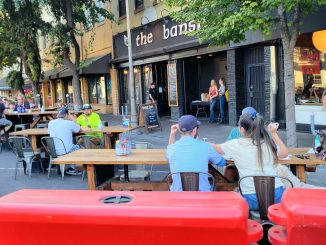
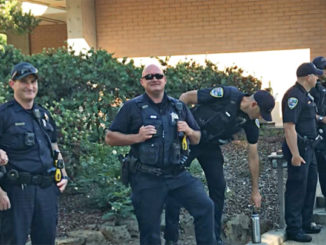
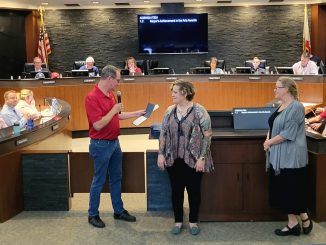
Be the first to comment